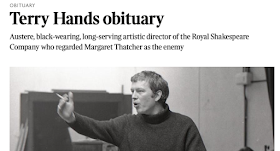James Lewis QC, representing the US in the Assange case, as reported by BBC News: "The US is aware of sources, whose redacted names and other identifying information was contained in classified documents published by Wikileaks, who subsequently disappeared, although the US can't prove at this point that their disappearance was the result of being outed by Wikileaks."
Justin Webb in Radio Times, as reported by Press Gazette: “When BBC bosses say the young aren’t listening to BBC radio any more and we have to treat this as an emergency and run around as if our pants were on fire, my first reaction is: ‘Hey, what took you so long?’ My second is… Hmm. Perhaps the young will get old. It has happened before. Perhaps radio will outlive this panic, as it has outlived all others and potentially those to come. But it will only outlive the panic if well-meaning bosses resist the temptation to destroy the wireless in order to save it.”
Alan Rusbridger on Twitter: "Never been allowed here before. My op-Ed in the Daily Mail defending the BBC. By all means reform it. But don’t vandalise it."
Neil Allen, of The News, Portsmouth after being named Regional Sports Journalist of the Year for the second time running at the Sports Journalism Awards, as reported by HoldTheFrontPage: “I feel very fortunate to be here tonight because looking at the regional press how it is these days, especially with sport, it’s a tough time for us all. I look back at the last 18 months being on the South Coast, people in my position at the Bournemouth Echo, Southern Daily Echo and Brighton Argus have all lost their jobs, have all left, long-serving quality journalists have left, because of the state of the industry I’m afraid."
Roy Greenslade in the Guardian: "Aware of the tricks of his old trade, he is doing everything he can to avoid being subject to their wiles. Don’t do as I once did, do as I now say. As the ultimate purveyor of fake news, he was not about to open the door to truth. To that end, he refused to be interviewed by the BBC’s Andrew Neil during the December general election campaign. That proved to be something of a dry run for what has happened since. He is sealing himself, and his government, off from journalistic scrutiny."
Jeremy Clarkson in the Sunday Times [£]: "I didn’t get into motoring journalism to review Morrises and budget Citroëns. I got into it to write about alpine roads and Lamborghinis. In the same way that proper journalists don’t become journalists to do flower shows and village fetes. They all want to be Woodward or Bernstein."
Committee to Protect Journalists Asia program coordinator Steven Butler in a statement after Chinese authorities expelled Wall Street Journal journalists Josh Chin, Chao Deng, and Philip Wen in retaliation for a headline (above): "China's expulsion of the journalists makes the country appear less like a confident rising power than a thin-skinned bully. During a global health emergency, it is counterproductive for the Chinese authorities to be limiting the flow of news and information."
- Writing in the Telegraph [£] Ensor says: "In the days before she was killed by regime fire in opposition-held Homs, Marie Colvin, the late Sunday Times foreign correspondent, said she thought the images and stories of suffering she was relaying would 'move the needle', that the world would wake up and try to stop what was happening. It never did."
[£]=paywall

































